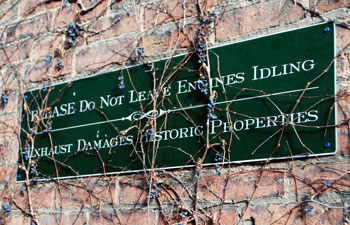Ann Arbor Restarts Talk on Vehicle Idling
At a work session held on Jan. 17, 2012, the Ann Arbor city council picked up on a conversation it started back in 2004, when it asked the city’s staff and environmental commission to craft an ordinance regulating the unnecessary idling of vehicles. Last summer, the environmental commission forwarded a draft idling ordinance and a white paper to the council, which was attached to the council’s Aug. 15, 2011 meeting agenda.

"Please do not leave engines idling. Exhaust damages historic properties." A private property owner has placed this sign in a downtown Ann Arbor alley to discourage delivery drivers from leaving their trucks running. It's advisory only. If an ordinance were enacted by Ann Arbor's city council, the city would post signs alerting drivers to the local law. (Photos by the writer.)
The council got a more detailed briefing on Tuesday, when the city’s environmental coordinator, Matt Naud, and two members of the city’s environmental commission addressed the council. The draft ordinance covers all engines, from heavy-duty trucks to passenger vehicles to generators. It would limit idling to 5 minutes in any given one-hour period. The draft ordinance includes a number of exceptions – for public safety vehicles and for cold weather, for example.
The goal of the ordinance is not to improve overall air quality in Ann Arbor, but rather to improve conditions in very specific localized contexts – school drop-off zones, for example. And the idea is not to create legislation that would then be aggressively enforced. Naud drew an analogy to the city’s ordinance regulating phosphorus-based fertilizers – no citations have ever been issued for ordinance violations, yet the city has achieved a measurable reduction in phosphorus loading in the Huron River since enactment of that ordinance.
Reaction from councilmembers was mixed. Jane Lumm (Ward 2) and Marcia Higgins (Ward 4) seemed more interested in exploring the possibility of changing drivers’ behavior through educational outreach than through enacting an ordinance.
Responding to the presentation and summarizing council commentary, mayor John Hieftje ventured that the council was interested in hearing about an educational program. He described that approach as a wiser course than talking about enforcement. Margie Teall (Ward 4), who until recently served as one of two city council representatives to the environmental commission, was more supportive of at least enacting an ordinance, in order to give the educational effort some “backbone.”
Any councilmember could choose to place the ordinance on a future meeting agenda. The council would then need to vote to give it initial approval, and a public hearing would be held, before a final council vote enacting a new ordinance. [Full Story]



